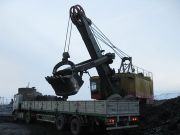The deal is expected to be closed in the first quarter of 2022, once the relevant permits have been received from the Federal Antimonopoly Service of the Russian Federation and a number of other conditions have been fulfilled. The buyer intends to finance the transaction using its own and borrowed funds.
Alexander Shevelev, CEO of Severstal, said:
“The sale of Vorkutaugol will allow us to focus on delivering our strategy to develop our steel and iron ore assets to be the leader of the future steel industry and to reduce our carbon footprint consistently. Reducing our consumption of coking coal through the use of the latest technologies is part of our ambitious decarbonisation programme. We expect to accelerate this in the future, including through the use of hydrogen fuel.
At the same time, we understand that in the medium-term, coal will remain an integral component of steel production. The sale of Vorkutaugol to a strategic investor focused on the development of coal assets not only reflects our commitment to reducing CO2 emissions but will also allow this asset to maximise its potential.
Over many years, the Vorkutaugol team has become an important part of the Severstal family, and we are confident that the company's fate is in good hands. We look forward to working closely with the new owner of Vorkutaugol to support the transition of our workforce and maintain the highest standards of health and safety, and will continue our cooperation into the future, as we will remain a key consumer of Vorkutaugol coking coals. The terms of the agreement with the buyer include an off-take contract guaranteeing Severstal's supply of raw material for the next five years.”
Vorkutaugol contributed 14.3% of Severstal’s greenhouse gas emissions (scope 1 and 2) per annum. Part of the proceeds from the transaction will be used to finance the projects within Severstal’s ambitious decarbonisation strategy.
Andrey Tyasto, CEO of Russkaya Energiya, said:
“The purchase of Vorkutaugol confirms that we believe in the prospects for the development of the Russian coal industry and the great potential of the Arctic zone. Our corporation has extensive experience in the mining industry, which we plan to apply to develop this new asset in our portfolio. It is important for us that Vorkutaugol maintains and enhances the best practices in corporate culture, social guarantees and industrial safety that have been developed as part of Severstal. We thank our partner for their confidence in us and look forward to further fruitful cooperation.”
Severstal is one of the world’s leading vertically integrated steel and steel related mining companies, with assets in Russia, Latvia and Poland. Severstal is listed on RTS and MICEX and the company’s GDRs are traded on the LSE. Severstal reported revenue of $6 870 million and EBITDA of $2 422 million in 2020. Severstal’s crude steel production in 2020 reached 11.3 million tonnes.
Vorkutaugol is one of the largest coal mining companies in Russia. It accounts for about 11% of the country's coking coal production. Vorkutaugol operates in the Pechora coal basin, which is a large raw material base for the metallurgical, coke-chemical and energy industries. The Vorkuta geological-industrial region has the largest coal reserves in Europe (about four billion tonnes). The company consists of five underground mines, one open pit mine and several auxiliary enterprises. Vorkutaugol delivered 10.3 million tons of production in 2020, including 4.7 million tonnes of coal concentrate. Vorkutaugol employs around 5,900 people.
The co-founders of OOO Russkaya Energiya are Roman Trotsenko (owning 70%), Chairman of the Board of Directors of Aeon Corporation and Andrey Tyasto (owning 30%).
Aeon Corporation is the largest Russian holding company operating on an international scale, investing in various heavy industries as well as transport and construction. The AEON Holding includes NOVAPORT, which is the largest network of regional airports in Russia (more than 21 airports). One of the Holding’s key focuses is a project for the production of fertilizers within the VTS "AZOT" framework. SDS Azot JSC is one of the largest producers of nitrogen fertilizers in Russia.
One of the Holding’s latest development directions is in coal. The AEON group includes projects such as Severnaya Zvezda LLC. The company is implementing a project to develop the Syradasai coal deposit in the Taimyr Dolgan-Nenets district of the Krasnoyarsk Territory. The project will produce approximately 7.0 million tons per year starting from 2026.
Assets developed by Severnaya Zvezda LLC include: the Yenisei seaport with a cargo turnover of up to 10 million tons / year, an airfield, a 30 MW power plant, an enrichment plant, a shift camp, a coal mine, a 61 km road. New technologies for power generation will be introduced during the implementation of the project. These will include the creation of an environmentally friendly block-modular pulverized coal power plant which could also be used in remote areas of the regions.
The project is being developed as part of the strategy for the development of the Arctic zone of the Russian Federation and ensuring national security for the period up to 2035 (Decree of the President of the Russian Federation dated October 26, 2020 No. 645). The project is included in the list of investment projects planned for implementation in Russia’s Arctic zone (Order Government of the Russian Federation dated February 1, 2021, No. 209-r), as well as in the Schedule for achieving the results of the "Northern Sea Route" federal project. The construction of the "Indiga" deep-water ice-free port in the area of the Indiga village is a priority project within the framework of the formation of the Nenets transport and production cluster. The estimated throughput of the port, the construction of which is planned to be carried out on the principle of public-private partnership, will eventually exceed 80 million tons. The port structure will include terminals for various types of cargo: coal, mineral fertilizers, general cargo, oil cargo, gas condensate (shipping terminal).


